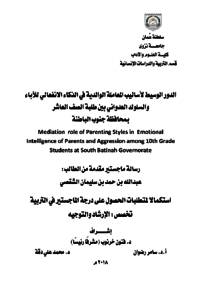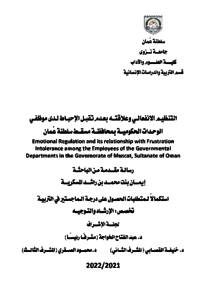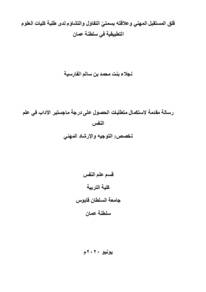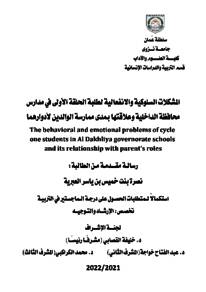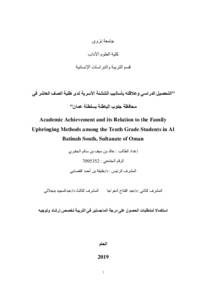Document
الدور الوسيط لأساليب المعاملة الوالدية في الذكاء الانفعالي للآباء والسلوك العدواني بين طلبة الصف العاشر بمحافظة جنوب الباطنة.
Publisher
جامعة نزوى
Gregorian
2018
Language
Arabic
English abstract
The study aims at identifying the Parinting Styles, emotional intelligence and aggressive behavior of the study sample members, knowing the relationship among them, determining the contribution of emotional intelligence of parents of children with the variation of parental (tolerance/ strictness), (consistent/ inconsistency), (moderation/ dominance), (protection/ negligence). The study sample is composed of (296) male and female students from the 10th grade in Al Batinah South Governorate, and a number of (296) parents of the sample members selected through the available manner. The researcher uses Scale for Parental Styles (Jibril, 1989), Emotional Intelligence Scale (Michael, 2008), and aggressive Behavior Scale (Abu Abah & Abdullah, 1995).
The researcher concluded that the parental styles prevailing in the sample members were at the following arithmetic mean: (moderation/ dominance) (3.01) with moderate prevalence rates, (tolerance/ strictness) (2.58) with moderate prevalence rates, (consistent/ inconsistency) (2.32) with low prevalence rates, (protection/ negligence) (2.19) with low prevalence rates. The parental arithmetic mean for the emotional intelligence level of parents as a total grade was (3.67) with high prevalence rates, while the arithmetic mean of the violent behavior level as a total grade was (2.71) with moderate prevalence rates. The results show that there are no statistically significant correlations between the emotional intelligence (and its secondary dimensions) and the violent behavior for the children (and its secondary dimensions). The results also show that there is a statistically significant correlation between the four emotional intelligence (and its secondary dimensions) and the pattern of (consistent/ inconsistency), and the pattern of (protection/ negligence). Furthermore, the results of the path analysis indicated that the parental emotional intelligence did not have a direct impact on the children's violent behavior, while the impact was indirect through determining the pattern of the parental treatment style used or preferred by the parents in raising their children.
Member of
Resource URL
Arabic abstract
هدفت هذه الدراسة إلى التعرف على العلاقة بين أساليب المعاملة الوالدية والذكاء الانفعالي والسلوك العدواني لدى أفراد عينة الدراسة، وتحديد إسهام الذكاء الانفعالي للوالدين في السلوك العدواني لدى الأبناء باختلاف أساليب المعاملة الوالدية: (تسامح/ تشدد) (اتساق/ عدم اتساق) (اعتدال/ تسلط)
حماية إهمال). تكونت عينة الدراسة من (296) طالبا وطالبة من طلاب الصف العاشر في مدارس محافظة جنوب الباطنة. وعينة من أولياء أمور أفراد العينة والبالغ عددهم (296) ولي أمر. تم اختيارهم بالطريقة المتاحة. واستخدم الباحث مقياس أساليب المعاملة الوالدية، من إعداد (جبريل، 1989)، ومقياس الذكاء الانفعالي، من إعداد (ميخائيل، 2008)، ومقياس السلوك العدواني، من إعداد (أبو عباه، وعبدالله، 1995).
وقد توصل الباحث إلى أن أساليب المعاملة الوالدية الشائعة لدى أفراد العينة جاءت حسب المتوسطات الحسابية التالية: (اعتدال/ تسلط) (3.01) بنسب انتشار متوسطة، (تسامح/ تشدد) (2.58) بنسب انتشار متوسطة، (الاتساق/ عدم الاتساق) (2.32) بنسب انتشار منخفضة، (حماية إهمال) (2.19) بنسب انتشار منخفضة. وكان المتوسط الحسابي لمستوى الذكاء الانفعالي للوالدين بلغ (3.67) بنسب انتشار مرتفعة. في حين بلغ المتوسط الحسابي لمستوى السلوك العدواني (2.71) بنسب انتشار متوسطة، وتظهر النتائج عدم وجود ارتباطات ذات دلالة إحصائية بين الذكاء الانفعالي وأبعاده الفرعية والسلوك العدواني للأبناء (وأبعاده الفرعية). كما تظهر النتائج وجود علاقة ارتباطية دالة إحصائية بين الذكاء الانفعالي (وأبعاده الفرعية) ونمط (الاتساق/ عدم الاتساق)، ونمط الحماية إهمال). وقد أشارت نتائج تحليل المسار إلى أنه لم يكن للذكاء الانفعالي الوالدي تأثير مباشر في السلوك العدواني للأبناء في حين كان التأثير غير مباشر من خلال تحديده لنمط أسلوب المعاملة الوالدية التي يلجأ أو يميل لها الأباء في تربية أبنائهم.
حماية إهمال). تكونت عينة الدراسة من (296) طالبا وطالبة من طلاب الصف العاشر في مدارس محافظة جنوب الباطنة. وعينة من أولياء أمور أفراد العينة والبالغ عددهم (296) ولي أمر. تم اختيارهم بالطريقة المتاحة. واستخدم الباحث مقياس أساليب المعاملة الوالدية، من إعداد (جبريل، 1989)، ومقياس الذكاء الانفعالي، من إعداد (ميخائيل، 2008)، ومقياس السلوك العدواني، من إعداد (أبو عباه، وعبدالله، 1995).
وقد توصل الباحث إلى أن أساليب المعاملة الوالدية الشائعة لدى أفراد العينة جاءت حسب المتوسطات الحسابية التالية: (اعتدال/ تسلط) (3.01) بنسب انتشار متوسطة، (تسامح/ تشدد) (2.58) بنسب انتشار متوسطة، (الاتساق/ عدم الاتساق) (2.32) بنسب انتشار منخفضة، (حماية إهمال) (2.19) بنسب انتشار منخفضة. وكان المتوسط الحسابي لمستوى الذكاء الانفعالي للوالدين بلغ (3.67) بنسب انتشار مرتفعة. في حين بلغ المتوسط الحسابي لمستوى السلوك العدواني (2.71) بنسب انتشار متوسطة، وتظهر النتائج عدم وجود ارتباطات ذات دلالة إحصائية بين الذكاء الانفعالي وأبعاده الفرعية والسلوك العدواني للأبناء (وأبعاده الفرعية). كما تظهر النتائج وجود علاقة ارتباطية دالة إحصائية بين الذكاء الانفعالي (وأبعاده الفرعية) ونمط (الاتساق/ عدم الاتساق)، ونمط الحماية إهمال). وقد أشارت نتائج تحليل المسار إلى أنه لم يكن للذكاء الانفعالي الوالدي تأثير مباشر في السلوك العدواني للأبناء في حين كان التأثير غير مباشر من خلال تحديده لنمط أسلوب المعاملة الوالدية التي يلجأ أو يميل لها الأباء في تربية أبنائهم.
Category
Theses and Dissertations

